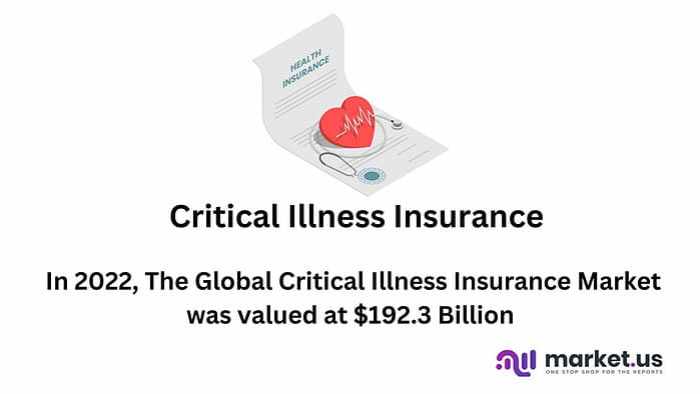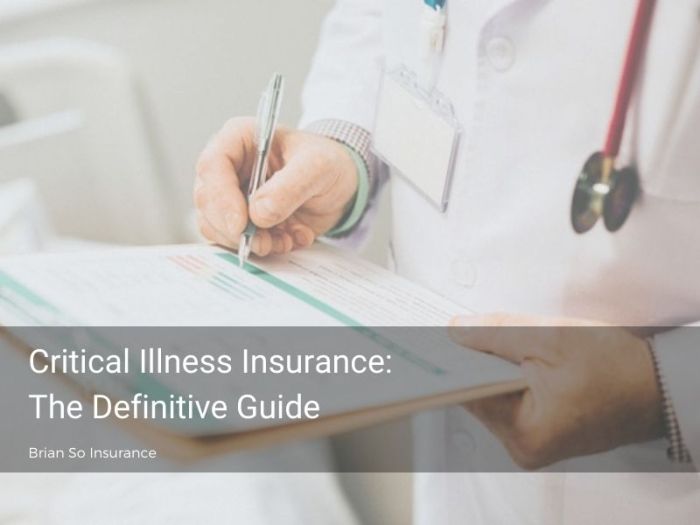Critical illness insurance provides a crucial financial safety net in the face of devastating diagnoses. However, navigating the complexities of this type of insurance can lead to costly errors. This comprehensive guide Artikels the most common mistakes people make when purchasing critical illness insurance in 2025, helping you secure the best possible coverage for your needs.
Mistake 1: Underestimating the Cost of Critical Illness
Many underestimate the financial burden associated with a critical illness. Treatment, rehabilitation, lost income, and ongoing care can quickly drain savings and leave families struggling. Simply focusing on the premium cost without considering the potential payout needed is a significant oversight. Failing to adequately assess your potential needs – including future inflation – can lead to insufficient coverage.

Source: market.us
How to Avoid This Mistake:
- Conduct a thorough needs analysis: Consider all potential expenses, including medical bills, rehabilitation, lost income, and long-term care. Use online calculators and consult with a financial advisor to estimate the potential costs.
- Factor in inflation: The cost of healthcare and living expenses consistently rises. Ensure your coverage will be sufficient in the future by choosing a policy with a substantial payout amount or an inflation-linked benefit.
- Consider your lifestyle and family responsibilities: The amount of coverage you need depends on your income, family size, and financial obligations. A higher income and larger family typically necessitate a higher coverage amount.
Mistake 2: Choosing the Wrong Policy Type
Critical illness insurance policies vary significantly in their features and benefits. Failing to understand the differences between single-payout, multiple-payout, and stepped-benefit policies can lead to inadequate protection. Understanding the definition of “critical illness” within the policy is also paramount, as definitions can differ widely between insurers.
How to Avoid This Mistake:
- Understand policy types: Research the various policy types (single, multiple, stepped) and choose the one that best aligns with your needs and risk tolerance. A multiple-payout policy offers greater financial security, while a stepped-benefit policy provides payments at different stages of illness.
- Carefully review the definition of critical illnesses: Compare the list of covered illnesses across different insurers. Some policies may exclude certain conditions or have stricter diagnostic criteria.
- Consider your health status: Pre-existing conditions may affect your eligibility or premium rates. Disclosure is crucial for accurate assessment.
Mistake 3: Ignoring the Waiting Period
Most critical illness policies have a waiting period before benefits are payable. This period can range from a few months to a year. Failing to account for this waiting period can leave you vulnerable during the initial stages of a critical illness.

Source: zqindustry.com
How to Avoid This Mistake:
- Understand the waiting period: Carefully review the policy document to understand the waiting period for different illnesses. Consider the implications of this waiting period on your financial planning.
- Assess your risk tolerance: If you have a higher risk of developing a critical illness, a shorter waiting period might be preferable, even if it means a higher premium.
Mistake 4: Neglecting to Review and Update Your Coverage
Your needs and circumstances change over time. Failing to regularly review and update your critical illness insurance policy can leave you underinsured as your responsibilities and financial circumstances evolve. This is especially crucial with significant life events such as marriage, having children, or changing careers.
How to Avoid This Mistake:
- Regularly review your policy: Schedule annual reviews of your policy to ensure it still meets your needs. Consider seeking professional advice from a financial advisor.
- Update your policy as needed: Notify your insurer of any significant life changes that may affect your coverage requirements.
Mistake 5: Focusing Solely on Premium Cost
While premium cost is a factor, prioritizing the cheapest policy over comprehensive coverage is a mistake. A lower premium may mean less coverage, leaving you vulnerable in the event of a critical illness. Compare policies based on their overall value, not just the premium.
How to Avoid This Mistake:
- Compare policies based on value: Consider the coverage amount, benefits, waiting periods, and exclusions when comparing policies. Don’t solely focus on the premium.
- Seek professional advice: A financial advisor can help you compare policies and choose the one that best meets your needs and budget.
Mistake 6: Not Understanding Exclusions and Limitations
All critical illness policies have exclusions and limitations. Failing to understand these can lead to disappointment if you need to make a claim. Carefully review the policy document to understand what is and isn’t covered.

Source: briansoinsurance.com
How to Avoid This Mistake:
- Read the policy document carefully: Pay close attention to the exclusions and limitations. If anything is unclear, seek clarification from your insurer.
- Compare exclusions across different policies: Look for policies with fewer exclusions and more comprehensive coverage.
Frequently Asked Questions (FAQ)
- Q: What is critical illness insurance? A: Critical illness insurance provides a lump-sum payment if you are diagnosed with a covered critical illness, such as cancer, heart attack, or stroke.
- Q: How much critical illness insurance do I need? A: The amount of coverage you need depends on your individual circumstances, including your income, expenses, and family responsibilities. A financial advisor can help determine your needs.
- Q: What are the common exclusions in critical illness insurance policies? A: Common exclusions can include pre-existing conditions, illnesses caused by self-inflicted injuries, and certain types of treatments.
- Q: How do I choose the right critical illness insurance policy? A: Consider your needs, budget, and risk tolerance. Compare policies from different insurers and seek professional advice.
- Q: Can I increase my coverage later? A: This depends on your insurer and policy terms. Some insurers allow for increases in coverage, but it might come with higher premiums based on your age and health status.
Conclusion
Purchasing critical illness insurance is a significant financial decision. By avoiding these common mistakes, you can significantly improve your chances of securing adequate and appropriate coverage to protect yourself and your family from the devastating financial impact of a critical illness. Remember to carefully research, compare policies, and seek professional advice to make an informed choice.
References
- NHS on Critical Illness Insurance (Example – Replace with relevant and reputable sources)
- Money Saving Expert (Example – Replace with relevant and reputable sources)
Call to Action
Don’t wait until it’s too late. Contact a financial advisor today to discuss your critical illness insurance needs and secure the protection you deserve.
Questions Often Asked
What is the difference between critical illness insurance and disability insurance?
Critical illness insurance pays a lump sum upon diagnosis of a specified critical illness, regardless of your ability to work. Disability insurance, conversely, provides income replacement if you become unable to work due to illness or injury.
How often should I review my critical illness insurance policy?
It’s recommended to review your policy annually or whenever significant life changes occur, such as marriage, childbirth, or a change in employment or health status.
Can I increase my coverage amount later?
The possibility of increasing coverage depends on your insurer and your health status at the time of the request. Some insurers allow increases, but may require a new health assessment.
What happens if my health deteriorates after purchasing the policy?
Most policies have a waiting period before coverage begins, typically a few months. Pre-existing conditions may be excluded, so it’s crucial to disclose all relevant health information during the application process.
